CEBISILE YAWA
CALA, EASTERN CAPE
Andile Yawa took his first train journey 36 years ago – to the mines. He was 20. “I didn’t have a blanket, only a blazer, and my mother had bought me a pair of secondhand shoes that were too tight,” he says. “That was the first time I wore shoes.”
Andile worked at Vaal Reefs Mine as a rock driller until he “fell ill in 2008 with phthisis disease” and was medically boarded. As is customary, he asked management if one of his seven sons could replace him.
Instead of his eldest, Luxolo, Andile chose Cebisile, the thirdborn, because he was “stronger” than the others, “patient” and a “perfectionist” – qualities ideal for a rock driller.
Cebisile worked at Vaal Reefs for a few years before moving to Lonmin, where he worked for just under 18 months. He was 25 years old when he was killed at Marikana.
Andile Yawa is a proud man, as hard as the hills he lives in, with a steely resolve and a clear notion of duty and tradition.
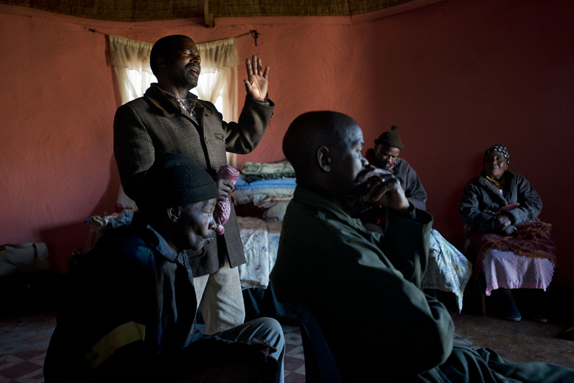
With his family gathered around him on the evening of Cebisile’s cleansing ceremony, he closes his eyes and shakes his head slowly.
“I blame myself for my son’s death because if I didn’t fall ill, Cebisile would be alive now. I’m still broken about it,” he says. “They cut his life short and he was a young man who still had to make a family, who still had to build a life.”
He speaks in a measured tone. Men do not cry in this part of the world. In the Mthingwevu mountain range near Cala in the Eastern Cape real men are bound to their families and by tradition. They go to the mines because the only other option is subsistence farming and survival can be capricious.
Andile and his older brother Zamla became miners because their family was “very poor” and they “had no options” as neither had gone far in school.
The brothers started on R60 a month at Vaal Reefs and with that money built the family home and put their two younger siblings, who are now teachers, through school.
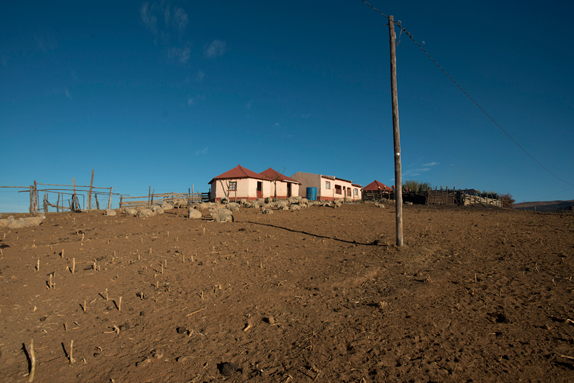
Cebisile’s remittance of R5 000 a month was used to buy goats and cattle and to fence off farming land and a plot where he planned to build a house. It was also used “so that his siblings could go to school”.
Mandla, one of Cebisile’s younger brothers, is studying for a BSc degree in agriculture at Fort Hare University. His fees, together with school fees for his four younger siblings, have now been taken over by Lonmin.
But Andile says there is still a “huge gap” in the family’s budget. They get by on his disability grant of R1 200 a month and the R290 each he gets for his son Siphelele and his two youngest children, the twins: Mkhuleli and Khuselwa. There is an additional R290 for Cebisile’s threeyearold daughter, Sisipho.
Cebisile had much in common with his father. “He was a man amongst men,” says Andile. “He never had bad intentions, he took a lot after me in that regard.”
A neighbour who has come to bear witness to the cleansing ceremony remarks upon the similarities during the formal speeches: “He loved farming, like you. He was disciplined, like you … He is a great loss to this community.”
Cebisile’s siblings agree that he was the strong, silent type. Much like their father.
The kraal, the sacred place where the ancestors roam, and where much of the cleansing ceremony takes place, including the sacrifice of animals – so that the ancestors will accept Cebisile’s soul – is also the site of happy memories.
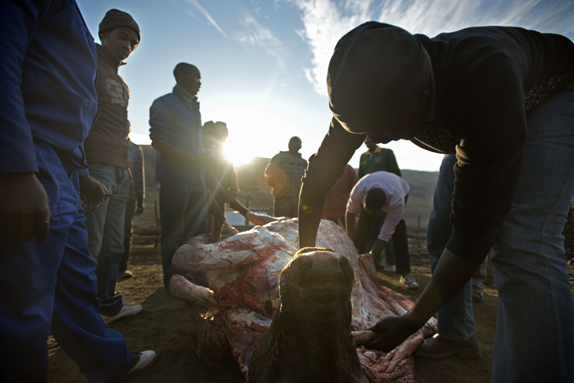
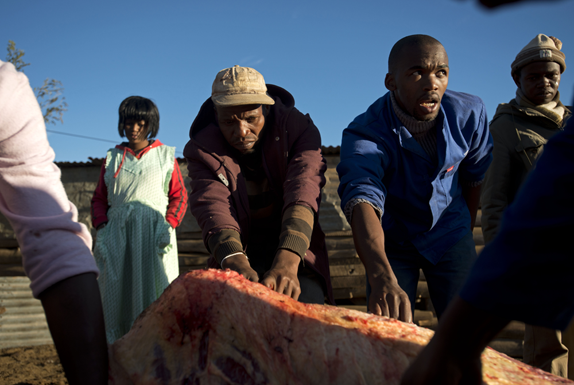
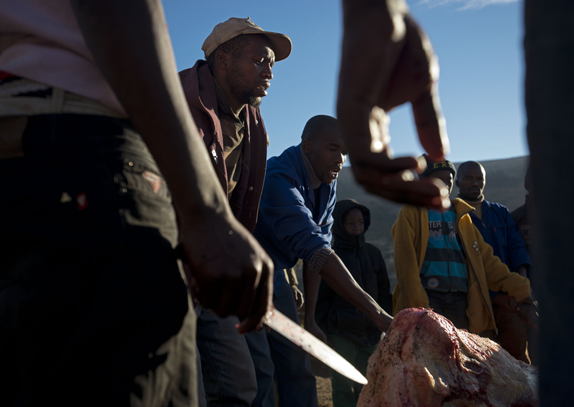
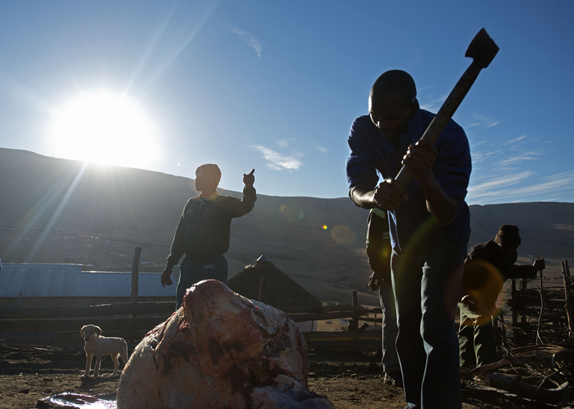
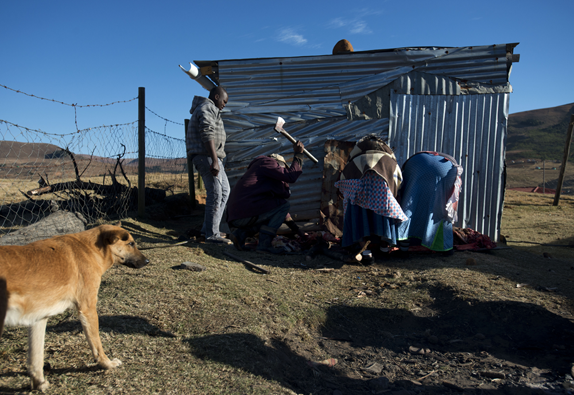
It is where the family celebrated the “many things” Cebisile or his siblings achieved. A sheep would be slaughtered and “we would sit around and I would tell the stories that my mother or father used to tell me,” says Andile.
The most recent celebration the patriarch remembers was when Cebisile returned from the mines in December 2011 to weed and plough his father’s fields. “He did it so well that I had to slaughter a sheep just for him and then slaughtered another one for his other brothers and sister.”
Since his time on the mines some things have changed, Andile says, but many others have not. It was “risky” being a rock driller in the 1980s, but “I had no options”.
“I didn’t go to school and I had to ensure that the children had a better future. Cebisile too, he wasn’t good in school so I decided to send him there and he also supported his family.”
The emergence of the National Union of Mineworkers (NUM) in 1982 helped workers realise that they had rights, he says. “Before, every time you went on leave you had to resign and then start a new contract when you came back … with NUM we had permanent contracts.”
Unionism also helped with wage disputes because previously “the employers used to come between workers and make [wage disputes] a tribal thing and before long there would be killings between Zulu, Pondo and Xhosa,” he says.
However, he resigned from NUM in 1996 when, during a strike, the union agreed that workers would return to work while wage negotiations continued: “I’m not sure if they presented our demands or they just told management that they were controlling the situation. I resigned because of this dishonesty. This is what happened at Marikana as well. [NUM and management] ignored the miners again.”
Despite his son’s death and his personal experiences of migrancy and the mining sector, Andile insists that mining is not a bad thing.
“It plays a big role in South Africa because uneducated poor families can light their candles and have bread. But [the mining companies] are still not in touch with their employees’ needs. They need to improve the employees’ lives,” he says. “But I have all that I have because of the mines.”
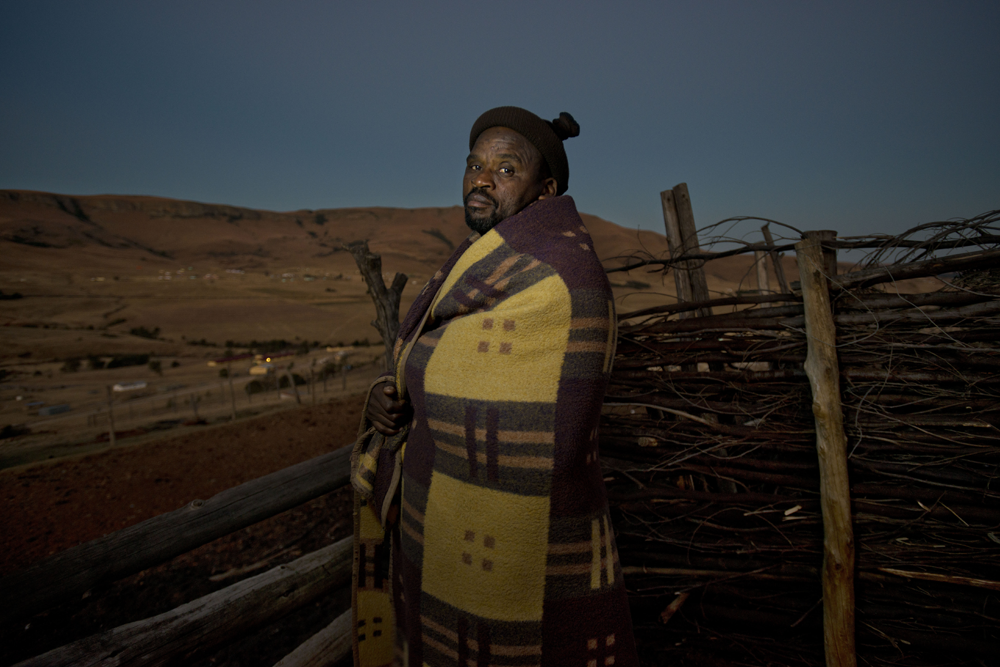
Leave a Reply
You must be logged in to post a comment.